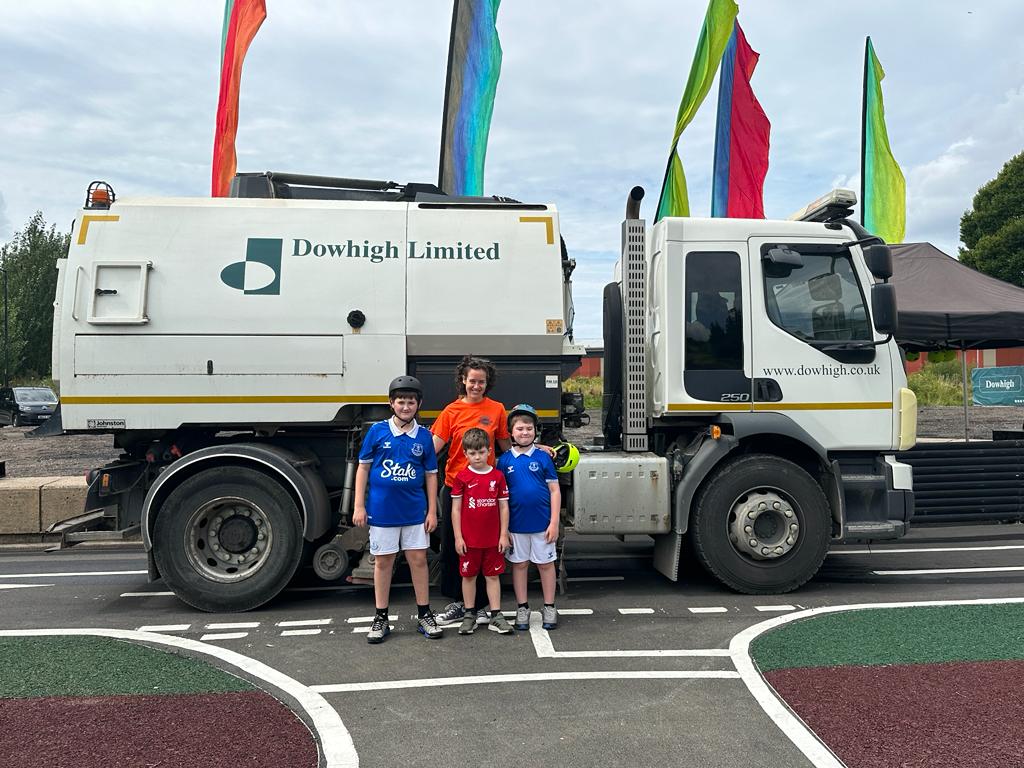Dowhigh are proud to confirm the completion of a unique project, Everton Park, part of Liverpool City Council “Mini Roads” scheme.
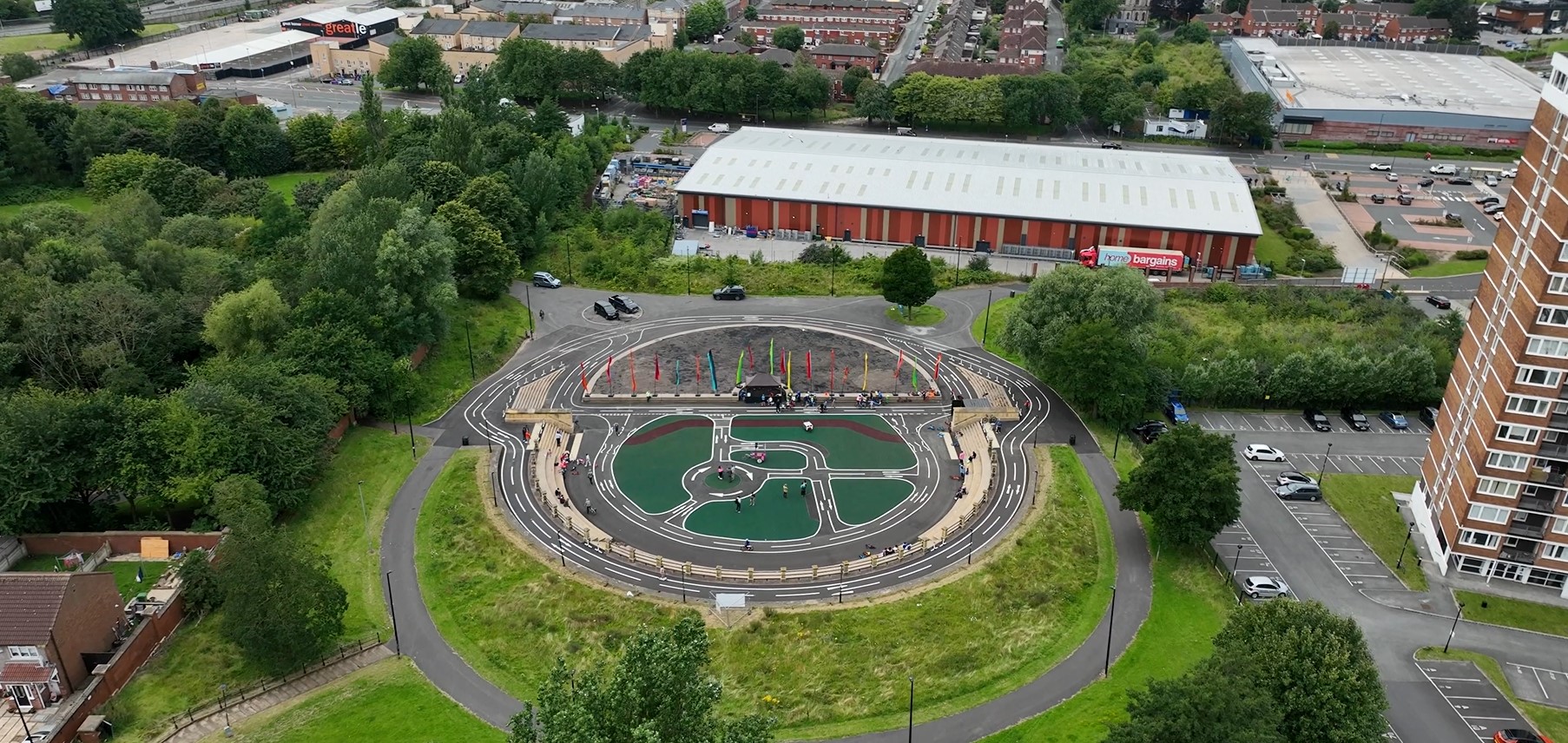
The £380,000 scheme, funded by both Liverpool City Council, through its Active Travel fund and Section 106 monies, and British Cycling, via its Places to Ride scheme, is a half a kilometre long facility which aims to attract and encourage thousands of youngsters to get cycling.
The scheme was awarded to Dowhigh Limited, and the project scope was to remediate and re-construct an underused concrete amphitheatre into the city’s first purpose-built children’s learn-to-ride facility.
The original scope of works outlined the use of carbon-friendly asphalt as well as soft-play surfacing, the installation of railings as well as benches and tables to provide an all-year round asset which the community could be proud of.
Liverpool City Council had committed to working with not-for-profit local community organisation Peloton Liverpool, who already operate the BMX track in the Everton Park, and who themselves had committed to providing cycle sessions at the facility over the next five years.
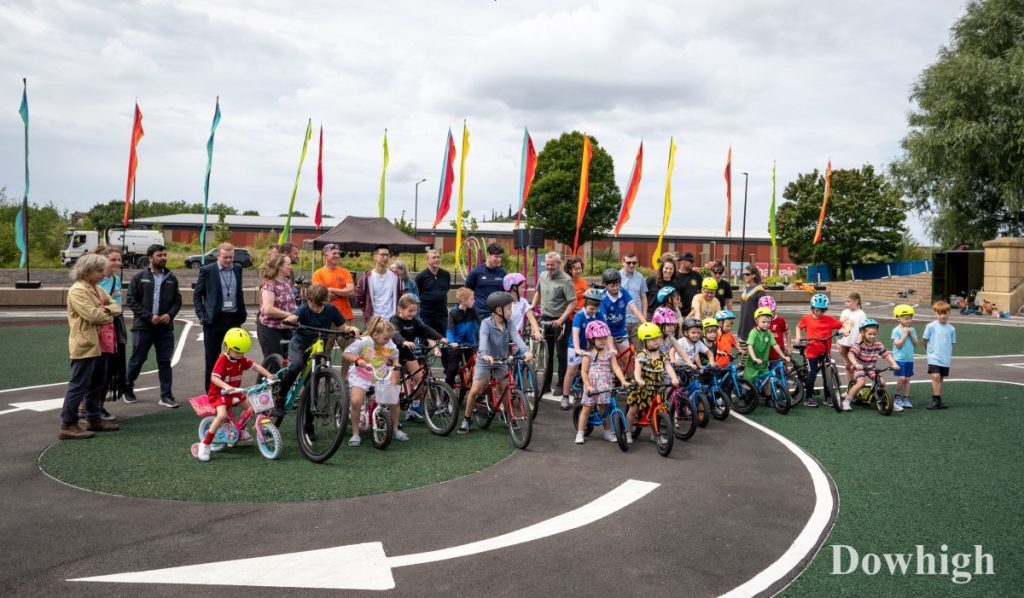
As part of that commitment, Peloton would be provided with with a container, workshop tools, balance bikes and associated accessories to host the cycling sessions.
When it came to planning and construction, Dowhigh Limited took an innovative approach to the scheme aiming to complete in a carbon friendly manner. For the remediation work, Dowhigh Limited recycled all the construction waste on site via our recycling plant in Hawthorne Road, Bootle. This initiative helped us divert over 600 tonnes of construction waste from landfill which was recycled and used on site.
The collaboration with our Asphalt supplier CEMEX resulted in the use of Rubber Mix Asphalt – diverting one tyre from landfill for every tonne of asphalt laid. The Rubber Mixed asphalt also included Shell’s Carbon Sink Bitumen which was proposed to the council to be used as an alternative material, having the potential to create a carbon sink.
This was the first large-scale application trial of carbon sink bitumen, which is a bio-component binder consisting of biogenic material that locks carbon into asphalt during production and installation. This resulted in the CO2 emission savings of approximately 10.5 tonnes of embodied carbon emission saving just from the use of alternate material.
The Rubber Mulch installed to aid as a safety surface is made from rubber shred made from a mixture of resin shredded truck tyres and gives the appearance of bark and wood chippings creating a permeable play area surface.
As part of the project, Dowhigh also proposed the carbon capture garden on the unused pond fountain which adjacent to the cycling track. The base of the reconstructed pond was built with different grades of recycled construction waste – which amounted to approximately 750 tonnes of recycled construction waste.
In addition to the recycled waste, biochar was added to the top layer, which aids in soil fertility and water retention. It also sequesters carbon dioxide from the atmosphere, with 1 tonne of biochar removing 3 tonnes of carbon dioxide. Thus, this garden can be classed as a carbon-capture garden providing a carbon sequestration of 6 tonnes of CO2 equivalent for the use of 2 tonnes of biochar.
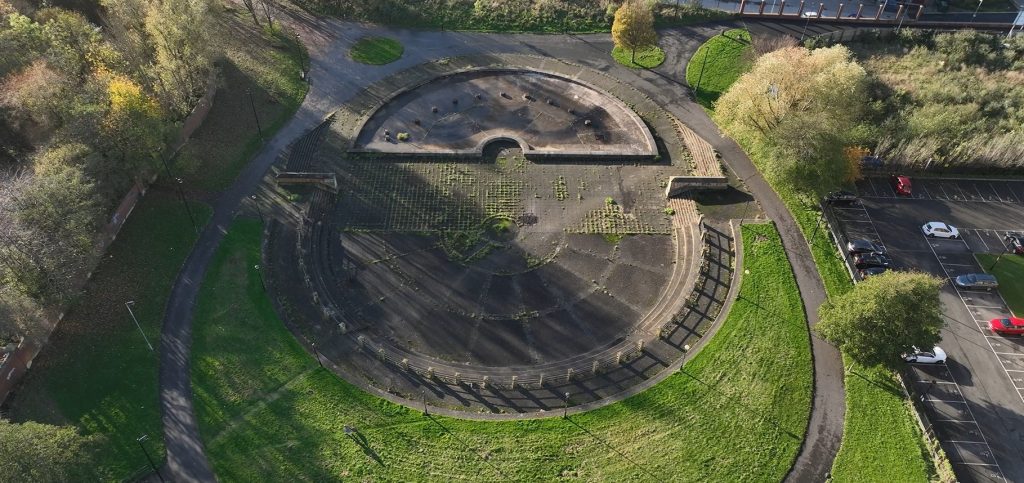
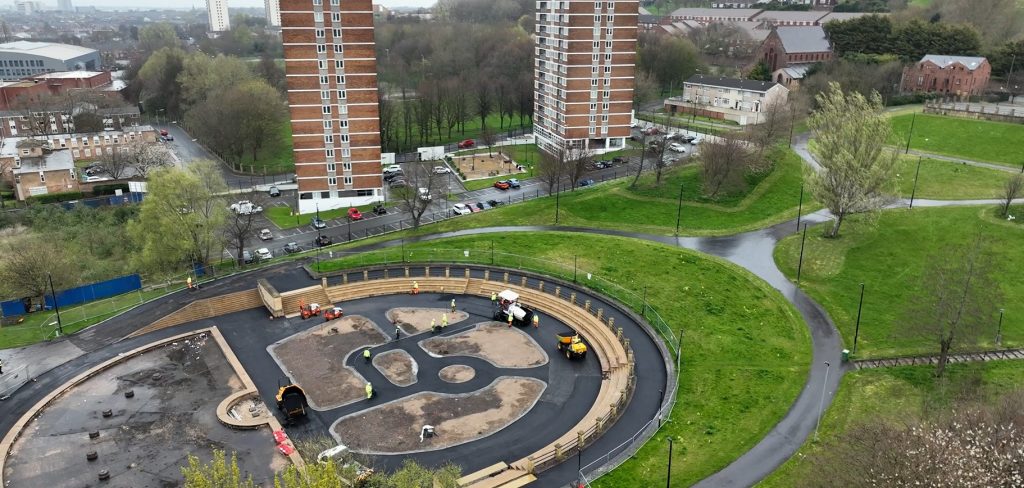
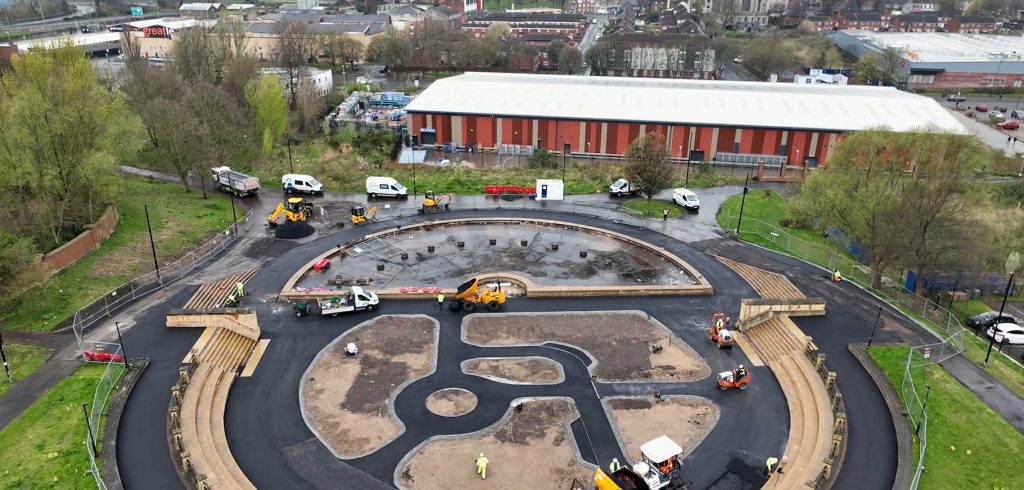
The site was officially opened on the 26th of July when a group of young children took their first laps on the new cycle track designed to resemble a realistic road layout with junctions and crossings.
We want Liverpool to be a great cycling city, and to do that we need to provide facilities which encourage our youngsters to get on their bike and develop a life-long habit of enjoying being on two wheels.
I’m delighted this Mini-Roads scheme has opened. It is going to provide a fantastic learning experience for our children to become confident riding around the city. This is a long-term investment which should benefit many thousands of children in the decade to come.
As well as this Mini-Roads facility, we’ve also connected Everton Park to the wider cycling network to further improve cycling options in north Liverpool.
There’s more to do, which is why we’re investing in more cycle lanes, but the jigsaw pieces are beginning to fall into place and this will have a huge impact on people’s health and Liverpool’s air quality.
Dan Barrington, Cabinet Minister for Transport and Connectivity
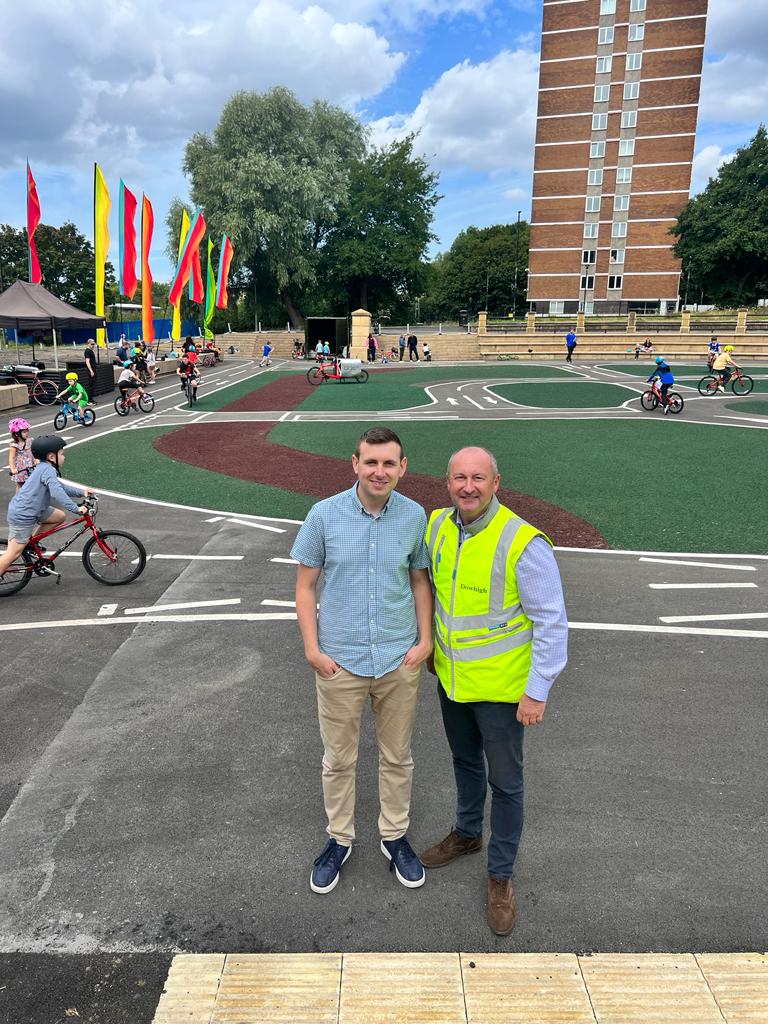
The primary purpose of the Mini-Roads is to support the early learning for young riders and be useful and attractive to people that need a safer place to learn to ride, practice or build confidence.
Alongside offering the general public a unique facility we’ve been working with local schools to develop fun and learning opportunities for primary school age children as well show them how a bike can be used for more than just fun.
The Mini-Roads will be the best of its kind in the North West, reanimating a fantastic space, a facility worthy of Everton Park and it’s community. Thanks to Liverpool City Council and British Cycling for keeping this idea alive throughout the pandemic.
Daniel Robinson, Managing Director of Peloton Liverpool
We’re delighted that British Cycling, as the National Governing Body for cycling in the UK, has been able to support and co-fund alongside Sport England’s Places to Ride fund and Liverpool City Council’s capital programme, this fantastic new learn to ride cycling facility at Everton Park.
It is class leading and offers a significant new dimension to the facilities already offered in the park.
The learn to ride facility will introduce many people, particularly children and young people, to cycling for the first time, help them learn to ride and experience the joy of cycling in a safe, off-road environment. It will hopefully allow them to make cycling a key part of their lives for many years to come.
We’ve been delighted to work with the city and its stakeholders to bring this to reality
Rob Pickering, North West Regional Manager from British Cycling
Everton Park’s new cycle track surface features a ground-breaking technical carbon sink, creating a hard wearing asphalt road surface for thousands of future road users to enjoy for many years to come.
With no compromise on quality or longevity, the new asphalt road is recyclable, and most of this carbon will not re-enter the atmosphere, even at the end of its life. Cemex is committed to reducing environmental impact by lowering the carbon footprint and increasing circularity – Everton Park has provided the perfect opportunity to showcase our expertise in this field.
Scott Jones, Director Asphalt and Paving Solutions EMEA, Cemex
Everton Park P2R Mini Roads was a great project to be involved with. The ambience of the cycling track with young children happily riding their bikes was second to none. I would like to express my heartfelt gratitude to all the stakeholders involved in the designing and delivery of the project. I hope this initiation will empower various parks and councils to build more spaces like this to encourage people of all ages to be physically and mentally fit.
Trevor Murray, Director Dowhigh Ltd
Since this was the first project of its kind I was involved in where the emphasis was more on community engagement than construction, it makes me glad to see people and community groups from diverse backgrounds driving the project ahead. I think the ideal use of the underutilised amphitheatre would have been to provide a safe location where young kids could practise riding bikes. It would be an honour to participate in such active travel schemes in the near future.
Matt Corke, Project Manager Liverpool HIP (Dowhigh Ltd)
